10 Apr 2018 | Focolare Worldwide
With her reassuringly calm demeanour, mother-of-two Maria – born in Italy, married to a French man – teaches her mother tongue in a notorious neighbourhood on the outskirts of Paris, in one of those schools which finds it practically impossible to retain its staff. In fact, determination, courage and passion are all required in no small measure to be able to work in such a disadvantaged area, scarred by drug and arms trafficking, with dealers right at the school gates. The pupils come from a wide range of cultures and different nationalities. Maria reflects, “For me, it’s quite simply a matter of responding to a calling to work for equal opportunities, to propose and deliver a programme of formation that aims high, and to bring the love of Christ where it seems to be lacking.” Maria explains how coming into contact as a child with Chiara Lubich nurtured this aspiration and sustained her into adult life. “Thanks to the relationships of unity I live with those who share this same ideal, I’m able to refresh my outlook and attitude every day, whatever difficulties I face.” It was a real challenge, especially at the start, to understand how to interact constructively with the students, how to react to their verbal aggression and acts of vandalism. It soon became clear that in order to be able to help the children, it was necessary to get the families involved. In addition, the constant stream of new teaching staff needed support in order to engage effectively with such a complex situation. This kind of supportive synergy among colleagues gave an excellent example to the students. Maria continues,“From an educational perspective, I base my work on an interdisciplinary approach incorporating cultural projects. The organisation of any project requires teamwork, and our attempt as colleagues to live in the spirit of fraternity, offers a credible model to the students.” These projects often conclude with a trip to Italy, both motivating the students to learn the language and encouraging cultural exchanges with Italian youth, which can also provide an enriching experience of fraternity. “This kind of project,” relates Maria, “leads to the involvement of our pupils’ families in the life of the school, it establishes a relationship of trust in which we can seek solutions together so that no student is held back by economic problems.” In other words, Maria’s objective is to create an educational network involving families and teachers, all striving for the human and cultural development of these at-risk children. It is an approach which is already showing positive results. When Aïcha was disrupting her class, it was quietly – but firmly – explained to her how “everyone must do their part to live in harmony”. Her response was to write, “I’m sorry for how I behaved on Friday. I let myself down and it’ll not happen again. You’re a great person, you’re clever and wise. You pass true values onto your students and make us want to do well. I’ll never forget you.” The care and respect given to each child encouraged another pupil, Yanis, who was at first extremely reserved, to open up and display a hitherto unexpressed interest in art and history. The key is always the personal care and attention due to each individual with their own story and their own sensitivity. “I’ve learnt never to expect immediate results,” concludes Maria. “When a young person shows no sign of improvement, it’s important to keep on believing in them, accompanying them, not allowing yourself to be blocked by anything, but continuing to identify the positive within them and giving value to that. Every day, the challenge is to find the courage and strength to nurture hope through actions aimed at building true relationships”.
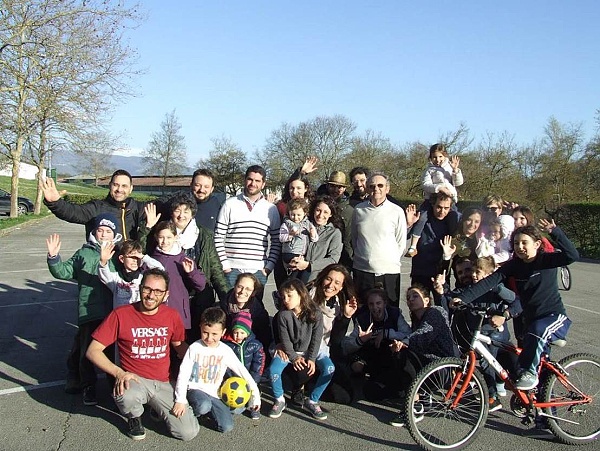
9 Apr 2018 | Focolare Worldwide
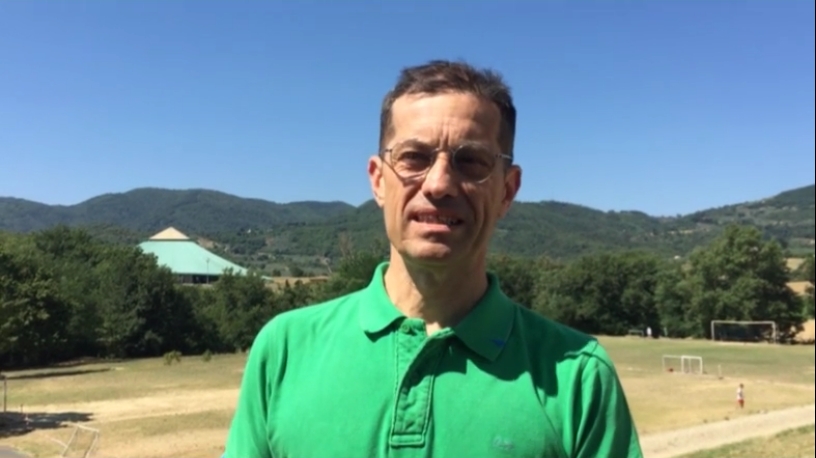 How did Loppiano take the news of the Pope’s visit? “Just a minute after the President, Maria Voce had spread the news on our social media pages and among the groups of inhabitants, there was a storm of messages expressing joy and wonder.” What does this event mean for you, as an inhabitant? “Even John Paul II was supposed to come here in the year 2000. The visit was cancelled four days before, due to a sudden change of programme. The desire for the Pope’s visit remained in our hearts then, and the same desire is present also today among the inhabitants. How would you describe the town to one who has no idea of what Loppiano is? “It is one of the places where one can more deeply experience the charism of unity that Chiara Lubich received from God, and from which the Focolare Movement was born and developed: that unity which is reached by building fraternal relationships, and living the testament of Jesus, “That all may be one.” About 1,000 people from 65 countries live in Loppiano, with various cultures, religions, and educational and social conditions. Here they learn first of all to become a community. What unites them is the desire to live the law on which the town is based: mutual love. This makes Loppiano a place of brotherhood.”
How did Loppiano take the news of the Pope’s visit? “Just a minute after the President, Maria Voce had spread the news on our social media pages and among the groups of inhabitants, there was a storm of messages expressing joy and wonder.” What does this event mean for you, as an inhabitant? “Even John Paul II was supposed to come here in the year 2000. The visit was cancelled four days before, due to a sudden change of programme. The desire for the Pope’s visit remained in our hearts then, and the same desire is present also today among the inhabitants. How would you describe the town to one who has no idea of what Loppiano is? “It is one of the places where one can more deeply experience the charism of unity that Chiara Lubich received from God, and from which the Focolare Movement was born and developed: that unity which is reached by building fraternal relationships, and living the testament of Jesus, “That all may be one.” About 1,000 people from 65 countries live in Loppiano, with various cultures, religions, and educational and social conditions. Here they learn first of all to become a community. What unites them is the desire to live the law on which the town is based: mutual love. This makes Loppiano a place of brotherhood.”  What’s life like in the town? “There are various economic activities, 11 training schools, a university institute, a big church that will host the Pope, many houses and cultivated fields. The inhabitants study, work, socialize, and live the normal life of all the towns, only that they try to do so by living the law of mutual love.” The Pope will arrive in Loppiano after Nomadelfia. What relationship is there between the two towns? “They have a lot in common, though with completely different histories and charisms: both are places of brotherhood that look to the lowly people and have the Gospel as their law. There have been various occasions for encounters, even recently. So we are happy that the Pope will land here with his heart full of what he will receive in Nomadelfia. He will be welcomed with the same love and enthusiasm.” Wherever the Pope goes, the spotlight of the world media turns on: how will the choice to visit Loppiano be interpreted? “I think that behind this desire is firstly the love for the charism of unity, gift which God has given us through Chiara Lubich. Bergoglio had met the Movement in Argentina, but even more closely as Pope. Loppiano is the place where this charism is most visible.” How are you preparing for the visit? “What Maria Voce said has become an imperative for us. In these 100 days we have undertaken the commitment to intensify the life of love and unity rooted in the Gospel, so that the Pope may find that “Where two or more united in my name ” (Matthew 18,20),” the presence of Jesus in our midst, is a reality. The Pope will stop to pray in the Church of Maria Theotokos, where there is a chapel dedicated to Christians of other confessions: what does this place represent? “Precisely Chiara wanted the Church to be in the geographic centre of Loppiano, so it would become the entire town’s point of unity. It is the place where we inhabitants meet daily to pray, but it is a reference point for the entire territory. It is the city’s seal.” Is it also a way of underlining the centrality of the figure of Mary in the Movement? “Certainly. Not by chance the Church was dedicated to Maria Theotokos, Mary Mother of God, to underline the strongly Marian feature of the charism and of the Focolare movement. And precisely because Mary is the Mother of God and thus of humanity, the Church is open also to people of other Christian confessions, and other religions and beliefs. Inside there are various points where each one can pray, feel at home and contemplate.” The Pope’s visit will take place on the 10th anniversary of the passing of Chiara Lubich. A coincidence? “I think we can consider this visit as a gift of God, a caress, and a sign of His love for the Work of Mary. Then we shall see what the Pope will want to say to us.”
What’s life like in the town? “There are various economic activities, 11 training schools, a university institute, a big church that will host the Pope, many houses and cultivated fields. The inhabitants study, work, socialize, and live the normal life of all the towns, only that they try to do so by living the law of mutual love.” The Pope will arrive in Loppiano after Nomadelfia. What relationship is there between the two towns? “They have a lot in common, though with completely different histories and charisms: both are places of brotherhood that look to the lowly people and have the Gospel as their law. There have been various occasions for encounters, even recently. So we are happy that the Pope will land here with his heart full of what he will receive in Nomadelfia. He will be welcomed with the same love and enthusiasm.” Wherever the Pope goes, the spotlight of the world media turns on: how will the choice to visit Loppiano be interpreted? “I think that behind this desire is firstly the love for the charism of unity, gift which God has given us through Chiara Lubich. Bergoglio had met the Movement in Argentina, but even more closely as Pope. Loppiano is the place where this charism is most visible.” How are you preparing for the visit? “What Maria Voce said has become an imperative for us. In these 100 days we have undertaken the commitment to intensify the life of love and unity rooted in the Gospel, so that the Pope may find that “Where two or more united in my name ” (Matthew 18,20),” the presence of Jesus in our midst, is a reality. The Pope will stop to pray in the Church of Maria Theotokos, where there is a chapel dedicated to Christians of other confessions: what does this place represent? “Precisely Chiara wanted the Church to be in the geographic centre of Loppiano, so it would become the entire town’s point of unity. It is the place where we inhabitants meet daily to pray, but it is a reference point for the entire territory. It is the city’s seal.” Is it also a way of underlining the centrality of the figure of Mary in the Movement? “Certainly. Not by chance the Church was dedicated to Maria Theotokos, Mary Mother of God, to underline the strongly Marian feature of the charism and of the Focolare movement. And precisely because Mary is the Mother of God and thus of humanity, the Church is open also to people of other Christian confessions, and other religions and beliefs. Inside there are various points where each one can pray, feel at home and contemplate.” The Pope’s visit will take place on the 10th anniversary of the passing of Chiara Lubich. A coincidence? “I think we can consider this visit as a gift of God, a caress, and a sign of His love for the Work of Mary. Then we shall see what the Pope will want to say to us.”
8 Apr 2018 | Focolare Worldwide
|
Christos anesti! Alithos anesti! Христос воскресе!Christ is Risen! Indeed He is risen! Khrishti unjal! Vertet unjal! Hristos voskrese! Vo istina voskrese! Khrystos uvaskros! Sapraudy uvaskros! Le Christ est ressuscité! En verité il est ressuscité! Kriste ahzdkhah! Chezdmaridet! Christus ist erstanden! Er ist wahrhaftig erstanden! Cristo è risorto! Veramente è risorto! Cristos a inviat! Adevarat a inviat! Khristos voskrese! Voistinu voskrese! Cristos vaskres! Vaistinu vaskres!
Christ is risen from the dead, trampling down death by death, and on those in the tombs bestowing life!Христос воскресе из мертвых, смертию смерть поправ, и сущим во гробех живот даровав!
|
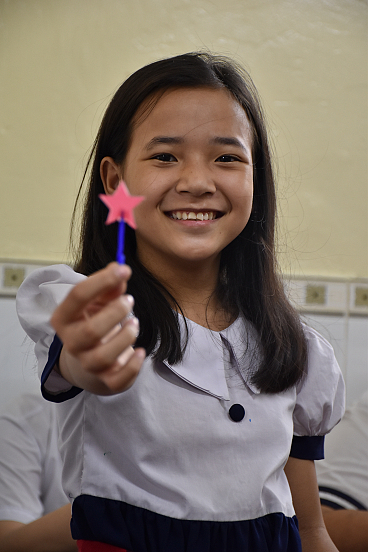
7 Apr 2018 | Focolare Worldwide
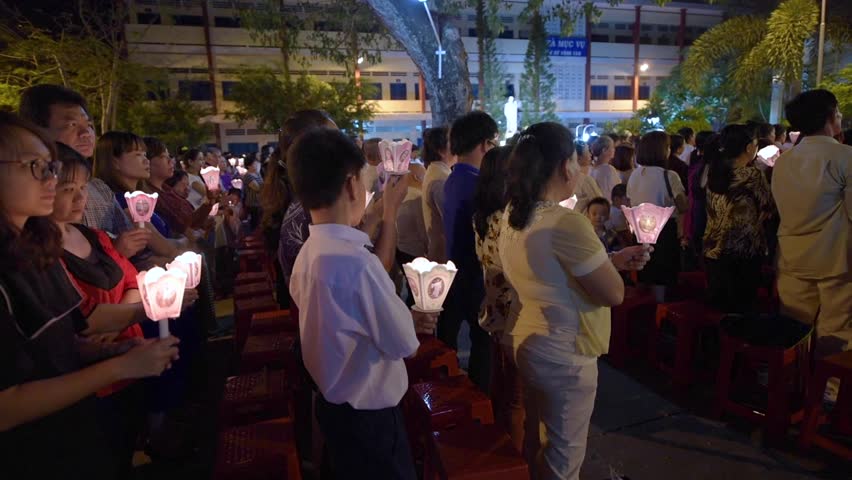 Easter is now over: today is Easter Monday and it’s a normal working day. It’s really hot and the rain is menacing the skies. It is only the Christians who are feasting. Here and there one can hear the cheering and the cries of Alleluia seeping out from the homes. And yet I’m in a Communist country. But as one goes out of the church, the streets are filled with the incredible sound of motorbikes blocking the traffic. The police in front of the cathedral have to direct the traffic. In order to take part in the Easter Triduum, one has to arrive 30 minutes before to find a place. In church I leave the bag on the bench and nobody touches it. I look at the people: many children, young people, couples and the elderly with their sober but smiling faces. I think of Europe, of the half-empty churches even on feast days. In these parts, even at 5 o’clock in the morning of any day, children, even small ones, together with the adults are in the first rows to sing. Here, everyone knows the prayers and the hymns by heart. In Saigon every corner is swarmed in a disorderly and nearly savage life. Yet, there is a lot of faith, perhaps as in no other Asian city. Because here faith comes at a cost. Everything costs in Vietnam. Some time ago I made a journey by bus, five and a half hours with a throng of people and in the heat. At a certain point quintals of Indian maize were loaded onto the bus among the travellers, dragged underfoot into the baggage compartment. The people started to scream whilst the driver and his assistant shouted at them to shut up. A lady near me who felt embarrassed at seeing me in that confusion, told me: “Life here is hard. Don’t forget it if you want to live here”. I don’t know that lady’s name and perhaps I’ll never see her again. But those words opened a new dimension within me. Life, theirs as well as mine, has to pass through pain, weariness, suffering, to then flow with joy. I understood her this way. From that day everything in me was simplified. Like everybody, I experience joy, but also pain and fatigue. I am one of them. I’m not even considered special because I’m a foreigner, but just one among many foreigners.
Easter is now over: today is Easter Monday and it’s a normal working day. It’s really hot and the rain is menacing the skies. It is only the Christians who are feasting. Here and there one can hear the cheering and the cries of Alleluia seeping out from the homes. And yet I’m in a Communist country. But as one goes out of the church, the streets are filled with the incredible sound of motorbikes blocking the traffic. The police in front of the cathedral have to direct the traffic. In order to take part in the Easter Triduum, one has to arrive 30 minutes before to find a place. In church I leave the bag on the bench and nobody touches it. I look at the people: many children, young people, couples and the elderly with their sober but smiling faces. I think of Europe, of the half-empty churches even on feast days. In these parts, even at 5 o’clock in the morning of any day, children, even small ones, together with the adults are in the first rows to sing. Here, everyone knows the prayers and the hymns by heart. In Saigon every corner is swarmed in a disorderly and nearly savage life. Yet, there is a lot of faith, perhaps as in no other Asian city. Because here faith comes at a cost. Everything costs in Vietnam. Some time ago I made a journey by bus, five and a half hours with a throng of people and in the heat. At a certain point quintals of Indian maize were loaded onto the bus among the travellers, dragged underfoot into the baggage compartment. The people started to scream whilst the driver and his assistant shouted at them to shut up. A lady near me who felt embarrassed at seeing me in that confusion, told me: “Life here is hard. Don’t forget it if you want to live here”. I don’t know that lady’s name and perhaps I’ll never see her again. But those words opened a new dimension within me. Life, theirs as well as mine, has to pass through pain, weariness, suffering, to then flow with joy. I understood her this way. From that day everything in me was simplified. Like everybody, I experience joy, but also pain and fatigue. I am one of them. I’m not even considered special because I’m a foreigner, but just one among many foreigners.  The story of that Man who hung from a cross, similar to those of many people I meet each day, reminds me of the words of that lady. I can find it in the poor who have nothing, in the sick man with a tumour, with bones jutting out from his ribs, who has no money to cure himself. Or in that lady, Giau, 64, who though poor, adopted a Down Syndrome child who had been literally thrown out by the parents. And yet, it’s Easter. Even for the Rohingya refugees, living between Myanmar and Bangladesh. It’s Easter in North Korea which seeks peace after having fired missiles. It’s Easter amongst the allied troops who are preparing for the umpteenth drill. It’s Easter for the children of Xang Cut, in the delta zone of Mikong, where the water is still infested through Agent Orange, thrown by the allies 40 years ago. And it’s Easter for the children of Saigon, gathered from the streets and given education by the teachers of Pho. They will have something to eat thanks to their heroic love. Even here, in the midst of many challenges, dangers, widespread pollution and an overwhelming sense of hopelessness, someone continues to smile, because they are loved and helped by a friendly hand. This is Easter: taking care of others, relieving their pain, sharing their tears. The world, the other, belongs to me. And my happiness passes through that of others, of many others.
The story of that Man who hung from a cross, similar to those of many people I meet each day, reminds me of the words of that lady. I can find it in the poor who have nothing, in the sick man with a tumour, with bones jutting out from his ribs, who has no money to cure himself. Or in that lady, Giau, 64, who though poor, adopted a Down Syndrome child who had been literally thrown out by the parents. And yet, it’s Easter. Even for the Rohingya refugees, living between Myanmar and Bangladesh. It’s Easter in North Korea which seeks peace after having fired missiles. It’s Easter amongst the allied troops who are preparing for the umpteenth drill. It’s Easter for the children of Xang Cut, in the delta zone of Mikong, where the water is still infested through Agent Orange, thrown by the allies 40 years ago. And it’s Easter for the children of Saigon, gathered from the streets and given education by the teachers of Pho. They will have something to eat thanks to their heroic love. Even here, in the midst of many challenges, dangers, widespread pollution and an overwhelming sense of hopelessness, someone continues to smile, because they are loved and helped by a friendly hand. This is Easter: taking care of others, relieving their pain, sharing their tears. The world, the other, belongs to me. And my happiness passes through that of others, of many others.
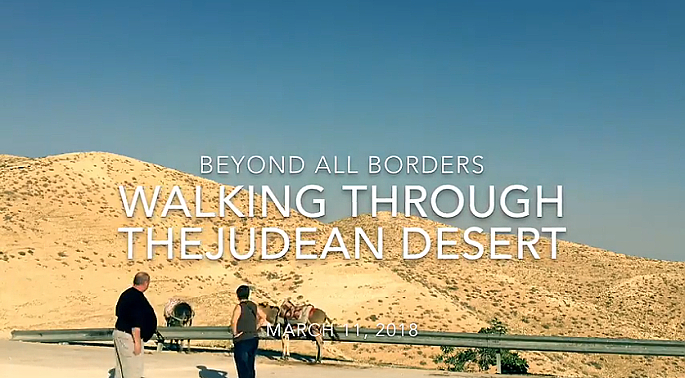
26 Mar 2018 | Focolare Worldwide

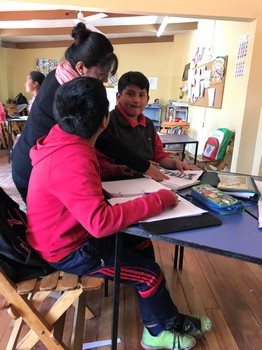
25 Mar 2018 | Focolare Worldwide
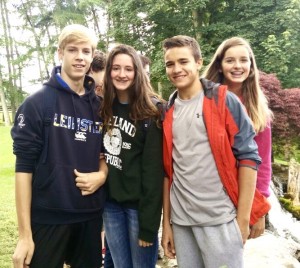 Green and friendly Ireland is full of excellent schools for students of all ages to learn English. Language Learning International (LLI) is no exception. Various kinds of study vacations are available with cutting edge learning techniques, family programs, culture, sport and entertainment, along with internships in France and Spain for Irish students. What distinguishes the educational approach of this school, which was founded in 1989 by Eugene Murphy in Dublin, is the quality of the relationships with the students in a welcoming atmosphere and a sensitive look towards the personal characteristics of each individual. But there is something else. The LLI, with its over 2 thousand students every year, is a representative of the Economy of Communion (EoC) in the training sector. The following experiences were drawn from the EoC website. “A boy showed up at summer camp with Asperger Syndrome, which we didn’t know anything about until he arrived. The first lodgings were not very appropriate for him, because they weren’t able to meet the particular needs of the youngster. They tried moving him to another family, but the difficulties began again. Even though the summer is a very intense season, in the business we want to be sure to ensure just and serene treatment for anyone comes, so we looked for another alternative until we were able to find an elderly woman who was happy to host the boy, being very familiar herself with the syndrome that her grandson also suffered from. Everything turned out positive for everyone: The student was able to take full advantage of the experience and return home happy in the evening. And the person in charge of relations with the family declared that the presence of the boy in the program had filled the entire season with value!” “Great atmosphere at the English course, in the classroom and excellent relationships established; one of the tests to be prepared, however, was an individual oral presentation. Suddenly a 15-year-old boy approached Eugene Murphy, the school’s founder and expert trainer. He told her that he would be unable to do it because of his stuttering. Eugene talked to other trainers and they decide to reassure the boy by doing the test privately. In the end, the teachers encouraged him to share the experience with others anyway, the young man agreed and, between his own emotion and the general emotion, the test concluded with a long applause from the class. It was then discovered that the boy had not spoken until the age of 7 and that performance in public turned out to be a sort of miracle that made him and his parents incredibly joyful”.
Green and friendly Ireland is full of excellent schools for students of all ages to learn English. Language Learning International (LLI) is no exception. Various kinds of study vacations are available with cutting edge learning techniques, family programs, culture, sport and entertainment, along with internships in France and Spain for Irish students. What distinguishes the educational approach of this school, which was founded in 1989 by Eugene Murphy in Dublin, is the quality of the relationships with the students in a welcoming atmosphere and a sensitive look towards the personal characteristics of each individual. But there is something else. The LLI, with its over 2 thousand students every year, is a representative of the Economy of Communion (EoC) in the training sector. The following experiences were drawn from the EoC website. “A boy showed up at summer camp with Asperger Syndrome, which we didn’t know anything about until he arrived. The first lodgings were not very appropriate for him, because they weren’t able to meet the particular needs of the youngster. They tried moving him to another family, but the difficulties began again. Even though the summer is a very intense season, in the business we want to be sure to ensure just and serene treatment for anyone comes, so we looked for another alternative until we were able to find an elderly woman who was happy to host the boy, being very familiar herself with the syndrome that her grandson also suffered from. Everything turned out positive for everyone: The student was able to take full advantage of the experience and return home happy in the evening. And the person in charge of relations with the family declared that the presence of the boy in the program had filled the entire season with value!” “Great atmosphere at the English course, in the classroom and excellent relationships established; one of the tests to be prepared, however, was an individual oral presentation. Suddenly a 15-year-old boy approached Eugene Murphy, the school’s founder and expert trainer. He told her that he would be unable to do it because of his stuttering. Eugene talked to other trainers and they decide to reassure the boy by doing the test privately. In the end, the teachers encouraged him to share the experience with others anyway, the young man agreed and, between his own emotion and the general emotion, the test concluded with a long applause from the class. It was then discovered that the boy had not spoken until the age of 7 and that performance in public turned out to be a sort of miracle that made him and his parents incredibly joyful”.  LLI Director, Cathy Young, tells about a new project that has involved the school in an adventure of openness with a geographic region that is quite far from Ireland: “We wanted to undertake a Economy of Communion project that focused on education. On the United World Association website, we learned of a fantastic project in Bolivia, called Fondazione Unisol, which offers support to several of the poorest families in Cochabamba. We made contact and have put together a project that will finance the purchase of new books and portable computers, furnish new desks and chairs for classrooms, and support the work of two teachers”. “This reciprocal exchange,” says Cathy, “is one of the most beautiful aspects of our collaboration, and it helps us to live better in our daily work environment.” At LLI the students have a live learning experience of the meaning of many words, but the first is sharing. Chiara Favotti
LLI Director, Cathy Young, tells about a new project that has involved the school in an adventure of openness with a geographic region that is quite far from Ireland: “We wanted to undertake a Economy of Communion project that focused on education. On the United World Association website, we learned of a fantastic project in Bolivia, called Fondazione Unisol, which offers support to several of the poorest families in Cochabamba. We made contact and have put together a project that will finance the purchase of new books and portable computers, furnish new desks and chairs for classrooms, and support the work of two teachers”. “This reciprocal exchange,” says Cathy, “is one of the most beautiful aspects of our collaboration, and it helps us to live better in our daily work environment.” At LLI the students have a live learning experience of the meaning of many words, but the first is sharing. Chiara Favotti


 How did Loppiano take the news of the Pope’s visit? “Just a minute after the President,
How did Loppiano take the news of the Pope’s visit? “Just a minute after the President, 
 Easter is now over: today is Easter Monday and it’s a normal working day. It’s really hot and the rain is menacing the skies. It is only the Christians who are feasting. Here and there one can hear the cheering and the cries of Alleluia seeping out from the homes. And yet I’m in a Communist country. But as one goes out of the church, the streets are filled with the incredible sound of motorbikes blocking the traffic. The police in front of the cathedral have to direct the traffic. In order to take part in the Easter Triduum, one has to arrive 30 minutes before to find a place. In church I leave the bag on the bench and nobody touches it. I look at the people: many children, young people, couples and the elderly with their sober but smiling faces. I think of Europe, of the half-empty churches even on feast days. In these parts, even at 5 o’clock in the morning of any day, children, even small ones, together with the adults are in the first rows to sing. Here, everyone knows the prayers and the hymns by heart. In Saigon every corner is swarmed in a disorderly and nearly savage life. Yet, there is a lot of faith, perhaps as in no other Asian city. Because here faith comes at a cost. Everything costs in Vietnam. Some time ago I made a journey by bus, five and a half hours with a throng of people and in the heat. At a certain point quintals of Indian maize were loaded onto the bus among the travellers, dragged underfoot into the baggage compartment. The people started to scream whilst the driver and his assistant shouted at them to shut up. A lady near me who felt embarrassed at seeing me in that confusion, told me: “Life here is hard. Don’t forget it if you want to live here”. I don’t know that lady’s name and perhaps I’ll never see her again. But those words opened a new dimension within me. Life, theirs as well as mine, has to pass through pain, weariness, suffering, to then flow with joy. I understood her this way. From that day everything in me was simplified. Like everybody, I experience joy, but also pain and fatigue. I am one of them. I’m not even considered special because I’m a foreigner, but just one among many foreigners.
Easter is now over: today is Easter Monday and it’s a normal working day. It’s really hot and the rain is menacing the skies. It is only the Christians who are feasting. Here and there one can hear the cheering and the cries of Alleluia seeping out from the homes. And yet I’m in a Communist country. But as one goes out of the church, the streets are filled with the incredible sound of motorbikes blocking the traffic. The police in front of the cathedral have to direct the traffic. In order to take part in the Easter Triduum, one has to arrive 30 minutes before to find a place. In church I leave the bag on the bench and nobody touches it. I look at the people: many children, young people, couples and the elderly with their sober but smiling faces. I think of Europe, of the half-empty churches even on feast days. In these parts, even at 5 o’clock in the morning of any day, children, even small ones, together with the adults are in the first rows to sing. Here, everyone knows the prayers and the hymns by heart. In Saigon every corner is swarmed in a disorderly and nearly savage life. Yet, there is a lot of faith, perhaps as in no other Asian city. Because here faith comes at a cost. Everything costs in Vietnam. Some time ago I made a journey by bus, five and a half hours with a throng of people and in the heat. At a certain point quintals of Indian maize were loaded onto the bus among the travellers, dragged underfoot into the baggage compartment. The people started to scream whilst the driver and his assistant shouted at them to shut up. A lady near me who felt embarrassed at seeing me in that confusion, told me: “Life here is hard. Don’t forget it if you want to live here”. I don’t know that lady’s name and perhaps I’ll never see her again. But those words opened a new dimension within me. Life, theirs as well as mine, has to pass through pain, weariness, suffering, to then flow with joy. I understood her this way. From that day everything in me was simplified. Like everybody, I experience joy, but also pain and fatigue. I am one of them. I’m not even considered special because I’m a foreigner, but just one among many foreigners. 

 Green and friendly
Green and friendly